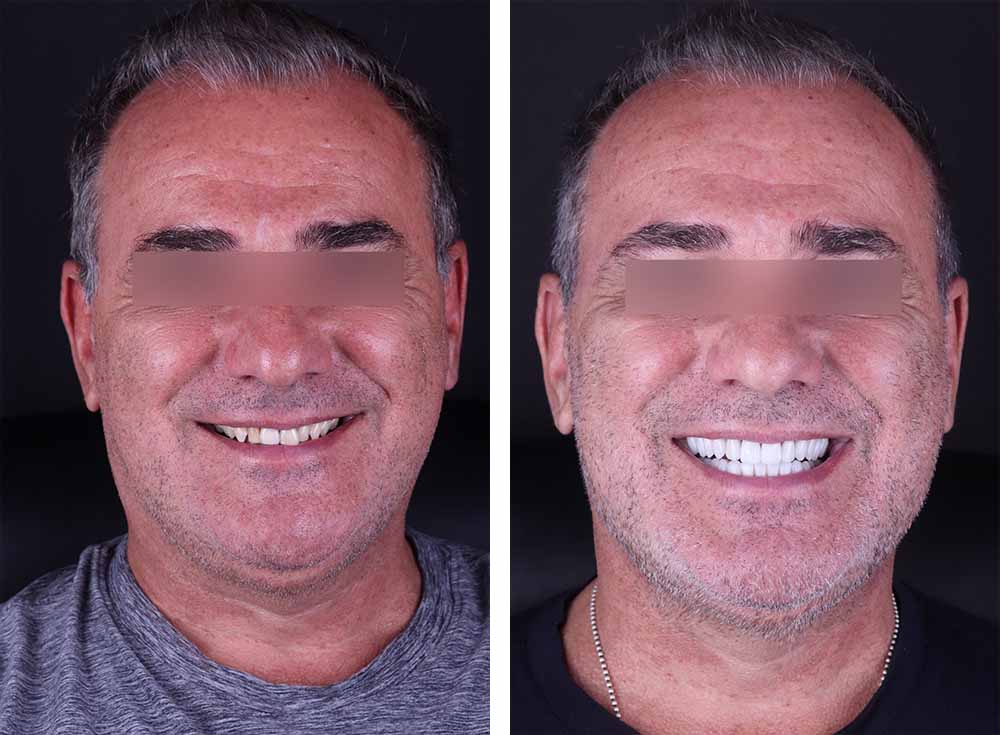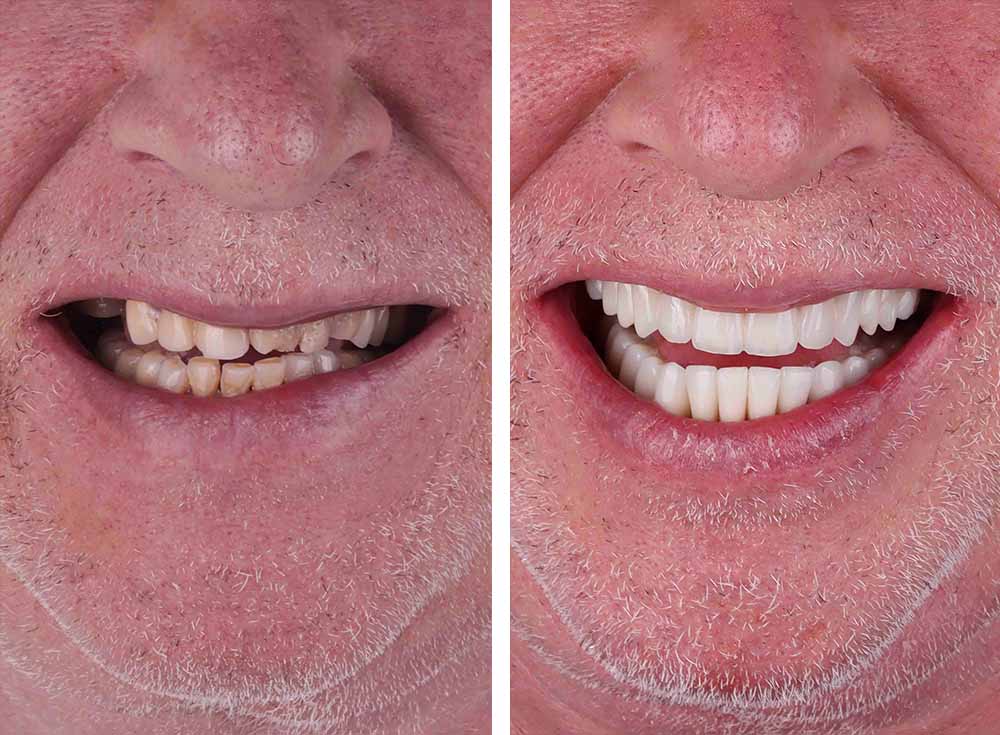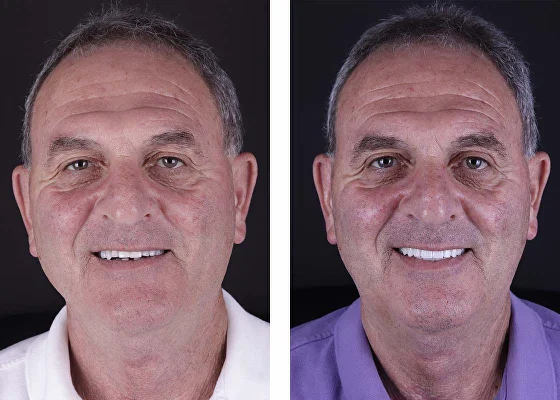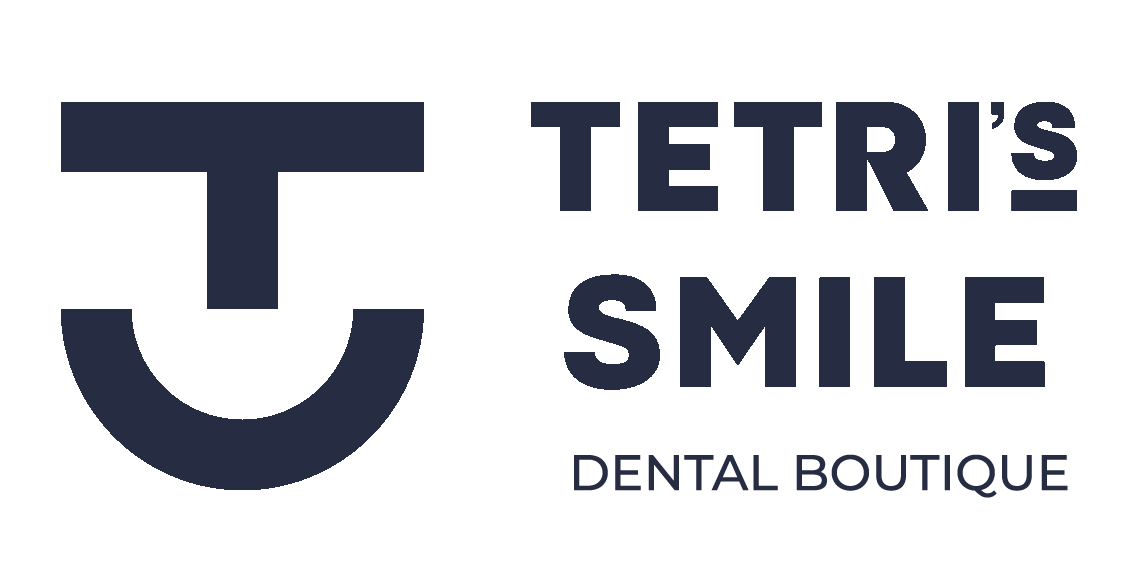Bruxism Treatment in Miami
Let us help you eliminate teeth grinding and jaw muscle hypertonicity. At Dr. Tetri’s clinic, we offer effective treatment for bruxism. We develop a personalized treatment plan to alleviate jaw pain.
Why is it important to start treating bruxism as soon as possible?
Constant teeth grinding occurs due to muscle spasms. Joint tension can lead to tissue damage. Enamel wears down quickly. Gum inflammation or tooth loosening may occur.
For bruxism, I recommend starting neuromuscular treatment. Our patients notice relief from tension and headaches even in the early stages of treatment.

Results – Before and After
Examples of successful bruxism treatment at Dr. Tetri's clinic. We see every case through to completion.

Example of bite and teeth grinding treatment
Description:
A man suffered from teeth grinding at night. Bruxism had worn down his enamel, disrupting his bite and causing muscle hypertonicity. Problems with his gums and an implant placed at another clinic also arose.
Solution:
We prepared a treatment plan to restore the golden ratio. We performed Tetri’s Smile™ Digital Smile Design and a mock-up for a preview of his future smile. We treated the temporomandibular joint and the patient immediately noticed relief in his facial muscles, continuing the treatment. The doctor performed gingivoplasty on the gums and installed veneers and crowns on the damaged units.

Example of bruxism treatment that damaged implants
A man experienced teeth grinding at night, which disrupted his bite and caused chewing problems. The treatment began with neuromuscular diagnostics, and Dr. Tetri discovered an issue with the temporomandibular joint. The teeth and crowns on the implants were severely damaged.
Solution:It was decided to preserve the 6 implants in the lower jaw and 2 in the upper jaw, but the damaged prosthetics were removed. Infected root teeth were extracted, and implantation with ceramic crowns was performed. The patient underwent a gneuromuscular course to relax the facial muscles. The jaw started functioning correctly, and the pain disappeared during chewing. The man’s face appeared rejuvenated – he now enjoys a beautiful smile!

Example of Prosthodontics and Bruxism Treatment
A patient came in complaining of constantly damaging his crowns. Neuromuscular diagnostics were conducted at the clinic to determine the causes of frequent headaches and neck stiffness. Dr. Tetri diagnosed bruxism and muscle hypertonicity.
Solution:Treatment began immediately. The old damaged prosthetics were replaced with zirconia crowns. A complete dental reconstruction was performed, along with occlusal correction to restore proper jaw alignment. The patient achieved a symmetrical smile and no longer suffers from teeth grinding.
TMJ and Teeth Grinding
Teeth grinding (bruxism) occurs when the jaw muscles involuntarily contract. The problem often arises at night when a person unconsciously moves their jaw. In the early stages, the condition causes discomfort and disrupts the functioning of the temporomandibular joint.
The constant clenching of the jaw leads to muscle hypertonicity (overexertion). Teeth grinding results in enamel wear, chips, and sensitivity. It can also damage dental prosthetics or implants. Temporomandibular joint disorder (TMD) occurs, causing stiffness in the neck, headaches, and pain in the ears and face. The jaw may also experience friction or a popping sound when opening.
Why do I grind my teeth?
Bruxism creates conditions for teeth grinding. The causes are often related to dental and jaw misalignment. Problems with TMJ arise from the change in contact between the upper and lower jaw, leading to hypertonicity of the jaw muscles, spasms, and overload. Some causes of bruxism include:
Incorrect bite
Damage to teeth or prosthetics
Chips or complete loss of a tooth
Gum inflammation or periodontitis
Frequent stress or tension
Why is bruxism bad?
In the chronic stage, the condition can lead to serious problems:
Causes sensitivity to cold/hot stimuli
Leads to tooth chipping and loosening
Triggers tooth decay and gum inflammation
Disrupts facial proportions and symmetry
Difficulties with chewing may also arise. During meals or conversations, the jaw may experience sudden pain or fatigue. Jaw popping or clicking may occur. Sometimes, serious problems with mouth closure, headaches, or prosthetic breakage can occur.
Treatment of bruxism with a TMJ dentist
We employ a comprehensive diagnostic approach to systematically address the causes of bruxism.
Stages of TMJ Diagnosis
Dr. Tetri conducts a medical history assessment, studying the nature of the condition and when the symptoms appeared. They examine the position of the temporomandibular joint and facial muscles.
Using K7 CMS, the movements of the lower jaw are measured to an accuracy of 0.1 mm. The speed of mouth opening and closing is assessed, and the correct position of the joint is determined.
The contractions of the muscles and the movement of the temporomandibular joint are examined. The presence of popping or clicking sounds during movement is assessed. The position of the neck and joints is analyzed to align the bite.
A 3D model of the future smile is created, virtually mapping out the plan for procedures. The alignment of the bite and restoration of the oral cavity are planned.
Stages of Bruxism Treatment
Dr. Tetri will address any inflammation and infection in damaged teeth. If necessary, enamel will be polished or damaged units will be removed. The correct bite will be established
Orthodontic treatment is recommended in cases of bite misalignment. After aligning the dental arch, tooth restoration is performed. Damaged roots are extracted and replaced with dental implants. Ceramic or zirconia crowns are placed on the implants. If the natural teeth are intact but heavily chipped, aesthetic veneers are installed.
Schedule an appointment with Tetri’s Smile to achieve the perfect smile. We will eliminate bite problems and jaw pain. You don’t have to endure constant discomfort or prosthetic failure.

